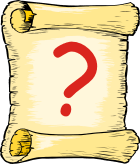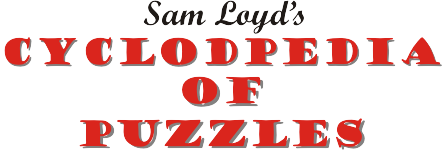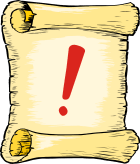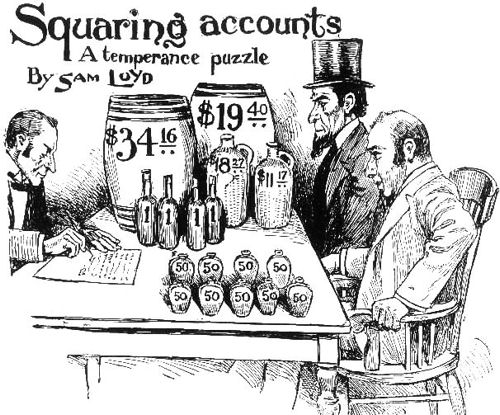



HERE IS AN ELEMENTARY puzzle in bookkeeping which anyone who has the faintest idea of the principles of profit and loss, should solve mentally just like a flash. I give it because it is said to be based upon an actual occurrence which was referred to me for a decision, and, as all the parties to the transaction held different, views, it, looked as if it might furnish a capital theme for a puzzle.
It is told that a temperance town in New Hampshire appointed an agent for one year to be the only person authorized to sell liquors. They advanced him $12 cash, and liquors amounting to $59.50. In rendering his accounts at the end of the year he showed extra purchases of liquors to the extent of $283.50. His total sales amounted to $285.80, on which he received a commission of 5 percent, in lieu of salary.
The sketch shows the agent and town committee taking account of stock, every item being marked at retail price. The puzzle is to tell how much profit the town made on its liquors.
In that story of the temperance town we find that the agent started with $12 cash and $59.50 in liquors, and in buying S283.50 more increased his stock to $343 wholesale. Upon this he put an advance of 10 percent, for a retail profit, which raises the value to $377.30. He sold $285.80 at retail, which leaves $91.50 on hand, as shown in the picture, which balance would be worth at wholesale, $83.18. The profit on the sales would amount to $25.98, which, added to the $12 cash and $59.50 liquors with which he started, would amount to $97.38, from which we deduct his commission of $14.29 to leave $83.19 for the balance on hand, which shows the accounts to be correct within two cents.
2. A REBUS.
My second, who is a relative, took my first after using my whole at dinner?
Cipher Ans. 14, 1, 16. 11, 9, 14.
NAPKIN
3.
Why is a sick Hebrew like an emerald? Because he is a Jew ill.
Why is a printer like the postman? Because he distributes letters.
What is the difference between a sun-bonnet and a Sunday-bonnet? A day’s difference.
4.
A turkey, cock or hen;
Behead me, and I upward soar,
Put on my head again,
Transpose me, then a beast I am,
Bloodthirsty, bold and wild,
That preys on many a helpless lamb,
And oft devours a child.
Fowl, owl, wolf.
6. A REBUS.
I cheer the pilgrim’s lonely way,
As toils he on from day to day;
Curtail me, and I then am found
What students do on college ground;
Curtail once more, and by inspection
You'll find I am an interjection.
Hope cheered the pilgrim.
8. Rebus
A word there is five syllables contains;
Take one away, —not one of them remains!
Mo-no-syllable.
9.
If an acrobat falls in a ditch, why is he likely to miss the beauties of summer? Because the fall follows right after the Spring, and he misses the Summer-set between them.
Pray, tell me, ladies if you can,
Who is that highly favored man,
Who, though he has married many a wife,
May still live single all his life?
A clergyman!
[Page 123]